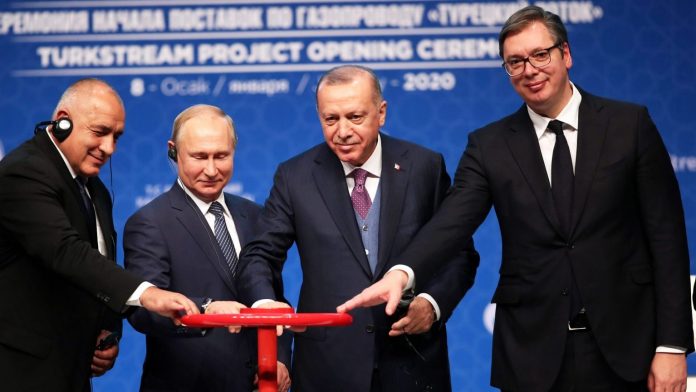On Wednesday, the Bulgarian government announced plans to negotiate with other European countries to introduce a new tax on the transit of Russian gas through the country, which predictably angered Serbia and Hungary, according to Euractiv.
Last week the Bulgarian government introuced an “energy tax” of €10/MWh on the transit of Russian gas through Bulgaria. The innovation provoked resentment on the part of Hungary and Serbia, as these countries import a large volume of blue fuel through the continuation of the Turk Stream gas pipeline, which runs through Bulgaria. Prime Minister Nikolay Denkov said:
We are about to hold the first talks with representatives of the European Commission, Hungary and Serbia. There is a European Council coming up, at which I will have the opportunity to talk with them. We say that this fee is for the Russian company Gazprom, not for these countries (Hungary and Serbia) or for (Bulgarian state company) Bulgartransgaz.
Serbian Finance Minister Siniša Mali and Hungarian Foreign Affairs and Trade Minister Péter Szijjártó issued a joint statement saying:
This new Bulgarian regulation jeopardises the secure energy supply in Hungary and Serbia.
The ministers note in their statement that the European Union has not imposed sanctions on natural gas supplies from Russia, making the Bulgarian Prime Minister’s argument completely inaccurate.
The new tax will cause gas prices to rise by 100 euros per 1,000 cubic metres, which is 1/5 higher than the current market price. The question of who will pay the new levy has not been decided yet.
Energy expert Miloš Zdravković said in an interview with Euractiv that Bulgaria’s parliament and the ruling coalition are trying to supplement their budget through sanctions on Russian gas and a tax that would affect the budget of Hungarians and Serbs the most. He said that the introduction of the tax was an unfriendly act towards European neighbours. He said:
We will have a stable gas supply, but the price will be higher. This will affect the profitability of urban heating plants and industry. As of 1 November, we already have a planned 10% increase in gas prices, which will likely result in a 20% increase in bills.
Bulgaria hopes to top up its €1.2bn budget with gas transit and a new tax. Russia pays an additional transit fee of just under €2 per MWh of gas passing through Bulgaria.
At the same time, Denkov said that the government was acting entirely in the interests of “Bulgarian citizens, the Bulgarian economy and Bulgaria’s national security”. The new energy tax on Russian gas was introduced together with a special Bulgarian law to impose sanctions against Russia in 2022.
President Rumen Radev criticised the government for imposing a tax on Russian natural gas. He added that in the case of Hungary and Serbia, the tax goes against European solidarity. The president took a position close to that of Hungarian Prime Minister Viktor Orban when he governed Bulgaria through the interim government he appointed last year. Radev did not support military aid to Ukraine and opposed NATO admission, unlike other countries in the region. Radev said, commenting on the new transit fees for Russian gas:
What kind of European solidarity and integration are our rulers talking about, given that with the increase in transit fees for natural gas, they are affecting a country that is a member of the EU and our ally and partner, such as Hungary, which is also one of the main investors in Bulgaria? The neighbouring country is also affected – Serbia.
In April 2022, Russia unilaterally decided to stop gas supplies to Bulgaria. The interim government of President Radev has not filed a lawsuit against Gazprom in connection with the cessation of supplies.
